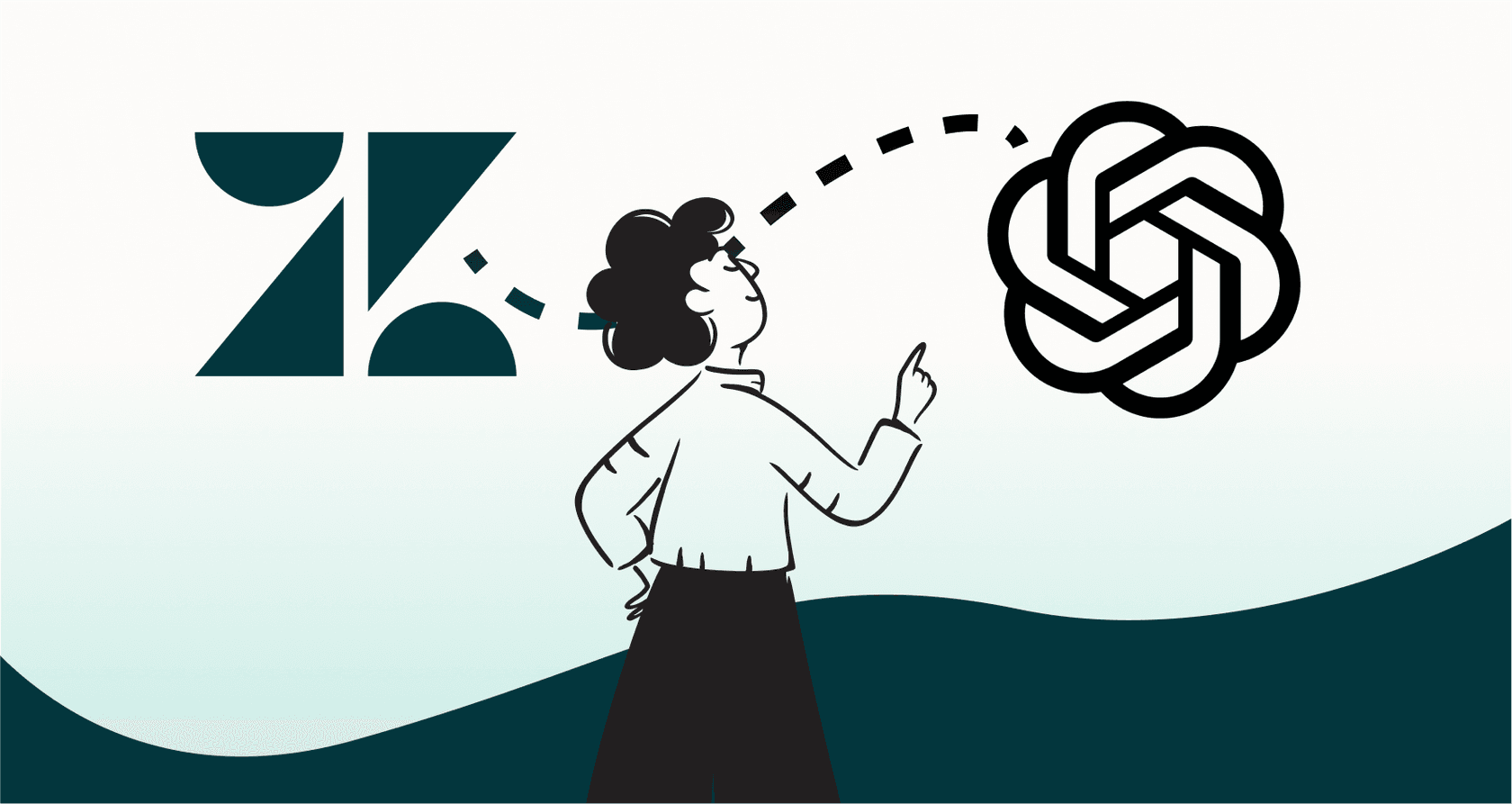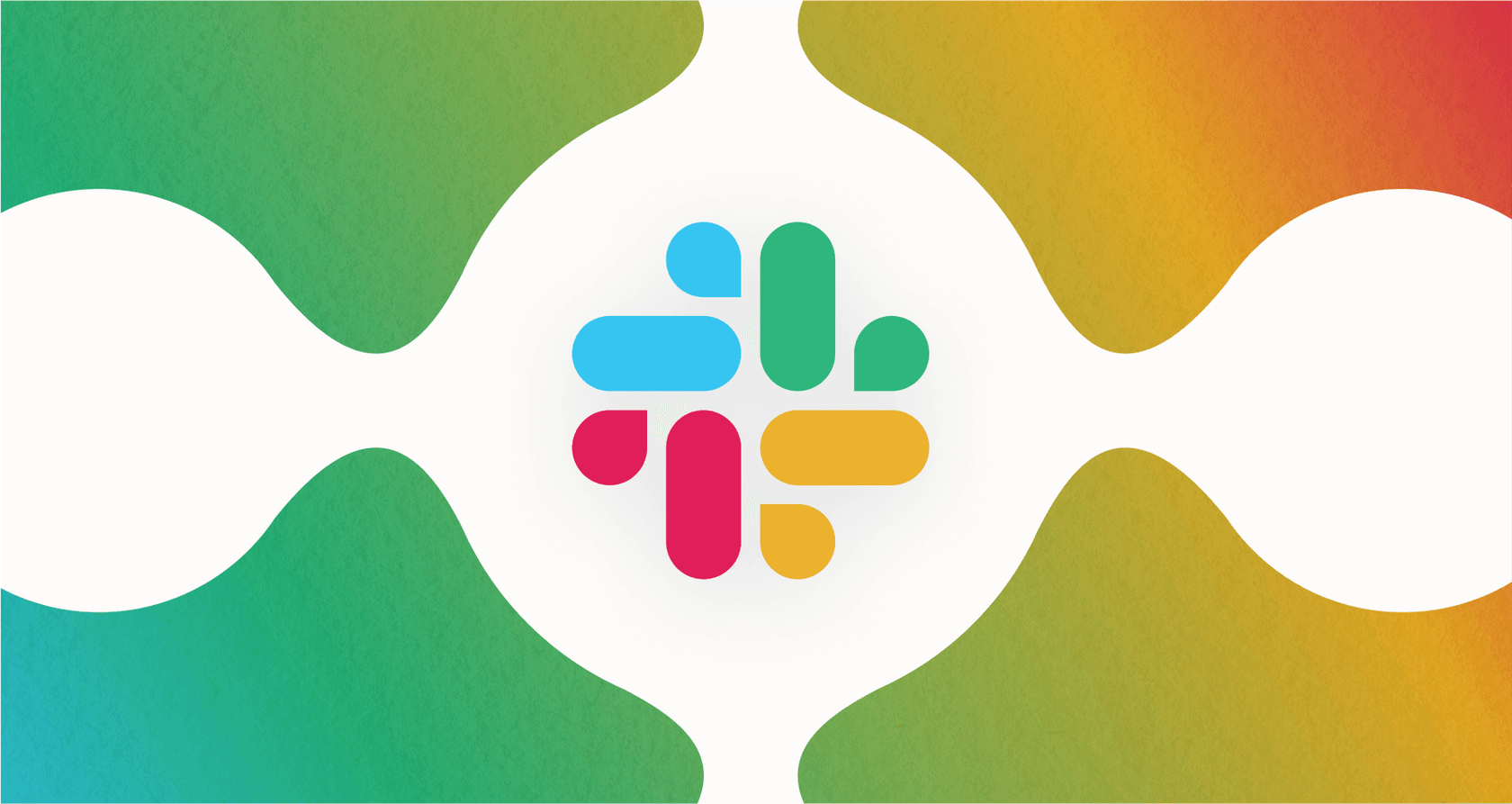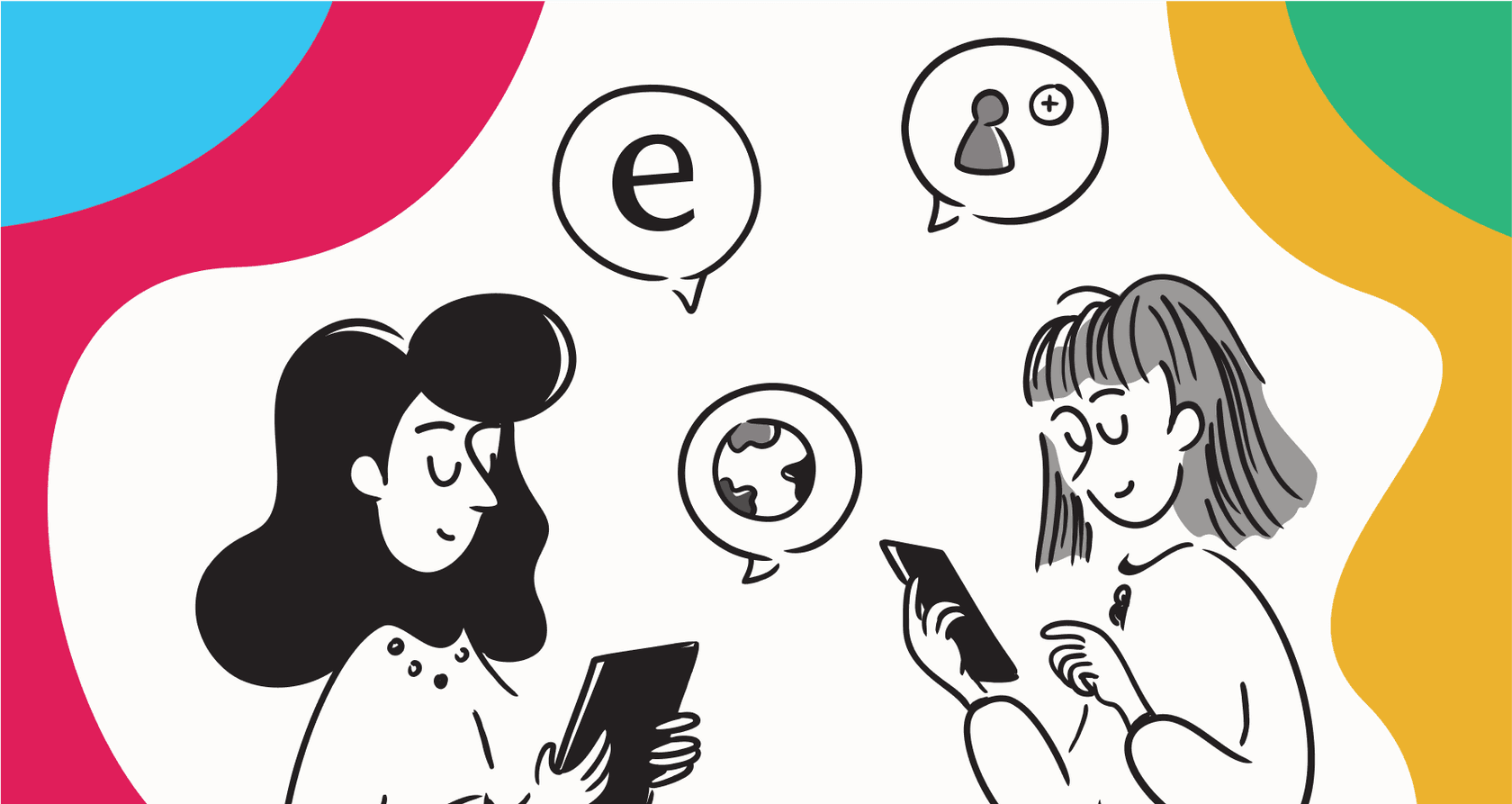
We all know the feeling. Work happens in Slack, but so does forgetting where anything is. That one important decision from three months ago? Buried. That crucial file? Lost in a sea of GIFs and project updates. You know the information is in there somewhere, but finding it feels like a full-blown expedition.
Slack AI Search Answers is Slack’s own attempt to fix this, promising to turn all that conversational chaos into clear, simple answers. But the real question is, does it actually pull it off?
This guide is an honest look at what Slack AI Search Answers can do, where it stumbles, and whether it’s the right tool for teams who can't afford to be wrong.
What are Slack AI Search Answers?
Slack AI Search Answers is a feature built into the Slack AI add-on that lets you ask questions like you would a person. Instead of just spitting out a list of messages with your keywords, it tries to understand what you're asking and piece together an actual answer from the chatter in your workspace.
It digs through public channels, your private channels, and any DMs you're in. It also looks at files (like PDFs and previews from Google Docs), canvases, and even articles from Slack’s own Help Center. The goal is to save you the headache of manually scrolling through endless threads so you can get what you need and get back to work. It respects all the existing permissions, so you won’t see answers from any content you aren’t supposed to.
Key features of Slack AI Search Answers
Slack AI is a bit more than just a fancy search bar; it’s a handful of tools meant to make your team's life a little easier. Here’s a rundown of what you get.
Natural language search
This is the main event. You can ask a normal question like, "What was the final call on the Q4 marketing budget?" instead of racking your brain for the right keywords. The AI then gives you a summarized answer with links back to the original messages or files it pulled from, so you can double-check the source yourself. It's pretty useful for digging up information that was clearly stated in a fairly recent conversation.

Conversation summaries and daily recaps
Ever come back from a few days off to an avalanche of unread messages? This feature is for you. Slack AI can create summaries of channels, threads, or DMs from a specific time frame, like the last week. It also has a daily recap that pulls the highlights from your most active channels. It's a decent way to catch up without reading every single message.

Huddle notes and file summaries
Slack AI has a few other tricks up its sleeve. It can take notes for you during huddles, grabbing key discussion points and action items. It can also automatically create summaries of some text-based files you share, which can save you from having to open a whole document just to understand the gist of it.
The limitations of Slack AI Search Answers
While those features sound good, they come with some serious downsides, especially for teams where getting the right information is critical. If you browse forums on Reddit, you'll see a lot of the same complaints pop up.
Accuracy issues: When chat history isn't the source of truth
The single biggest problem with Slack AI is that it treats your team's chat history as its main source of information. Think about it: Slack conversations are informal, messy, and often full of opinions that change. Most importantly, information in a chat can get outdated fast. An answer pulled from a thread that’s six months old might be completely wrong today.
That’s a pretty big gamble for any team, but especially for departments like HR, IT, or Operations, where acting on bad info can cause real problems. The AI can't tell the difference between a random suggestion and official company policy. For information you can actually trust, an AI should be pulling its answers from verified documents, like a company wiki or an official knowledge base. This is exactly what tools like eesel AI are designed to do by connecting directly to your sources of truth, whether that's Confluence or a shared Google Drive.
Fragmented knowledge: When answers live outside of Slack
Let's be real, most companies don't store their most important knowledge in Slack channels. The official stuff, policies, technical guides, customer support playbooks, usually lives on dedicated platforms like Confluence, Notion, or a helpdesk like Zendesk. Slack AI can barely peek into these external sources, which means it’s working with only a tiny fraction of your company's actual knowledge.
This means your team still has to leave Slack to find the real answer, which kind of defeats the purpose of having a search tool in the first place. A much better setup is an AI that brings all your knowledge together, no matter where it's stored. eesel AI does this with over 100 one-click integrations, creating a single brain for your company that you can talk to right from Slack.
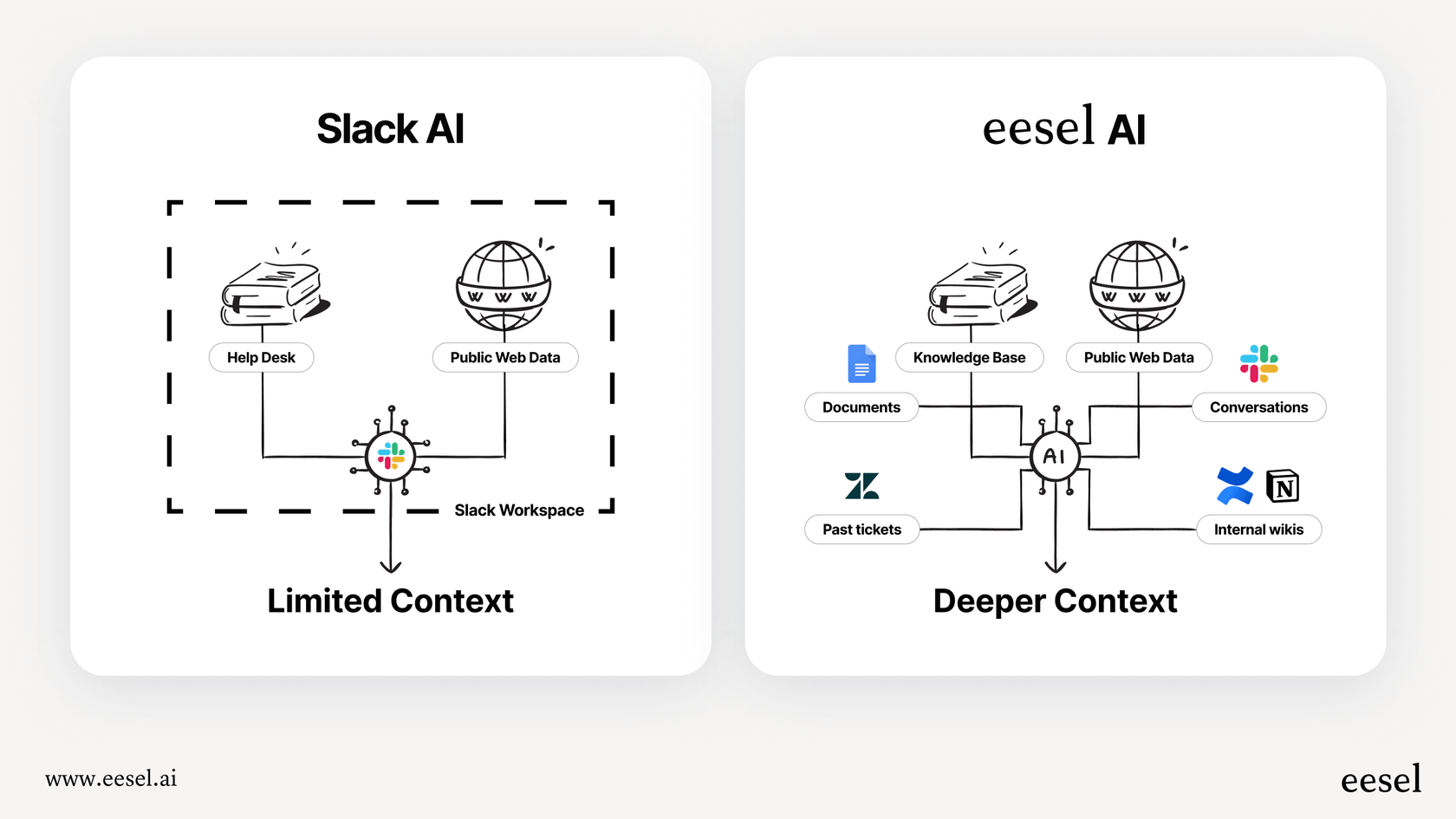
The high cost and lack of flexibility
Slack AI is expensive, and it's usually an all-or-nothing package. It’s sold on a mandatory, per-user basis for your entire workspace which, as many users have pointed out, can almost double a company's Slack bill overnight. To make things worse, there’s no free trial. You can't even kick the tires to see if it’s a good fit before you’re locked into a hefty bill.
This makes it hard to justify the cost. Why pay for every single person in your company to have a feature that maybe only a handful of them will actually use? It’s a huge departure from more modern and fair pricing. For example, eesel AI uses interaction-based pricing, so you only pay for what your team uses. This makes your costs predictable and gives you a much clearer idea of what you're getting for your money.
A better approach: Unifying knowledge with a dedicated AI agent
The answer to Slack AI’s problems isn't to give up on AI. It’s about using a specialized tool that’s actually built to manage enterprise knowledge. This is where eesel AI's AI Internal Chat comes into the picture.
Why connecting to authoritative sources matters
Unlike Slack AI, eesel AI is built from the ground up to connect to your official knowledge. It treats your Confluence pages, Google Docs, and help center articles as the gold standard, which means the answers it gives are always accurate and current. This completely gets rid of the risk of pulling bad information from some long-forgotten chat thread. When a policy gets updated in your wiki, eesel AI’s answers reflect that change immediately.
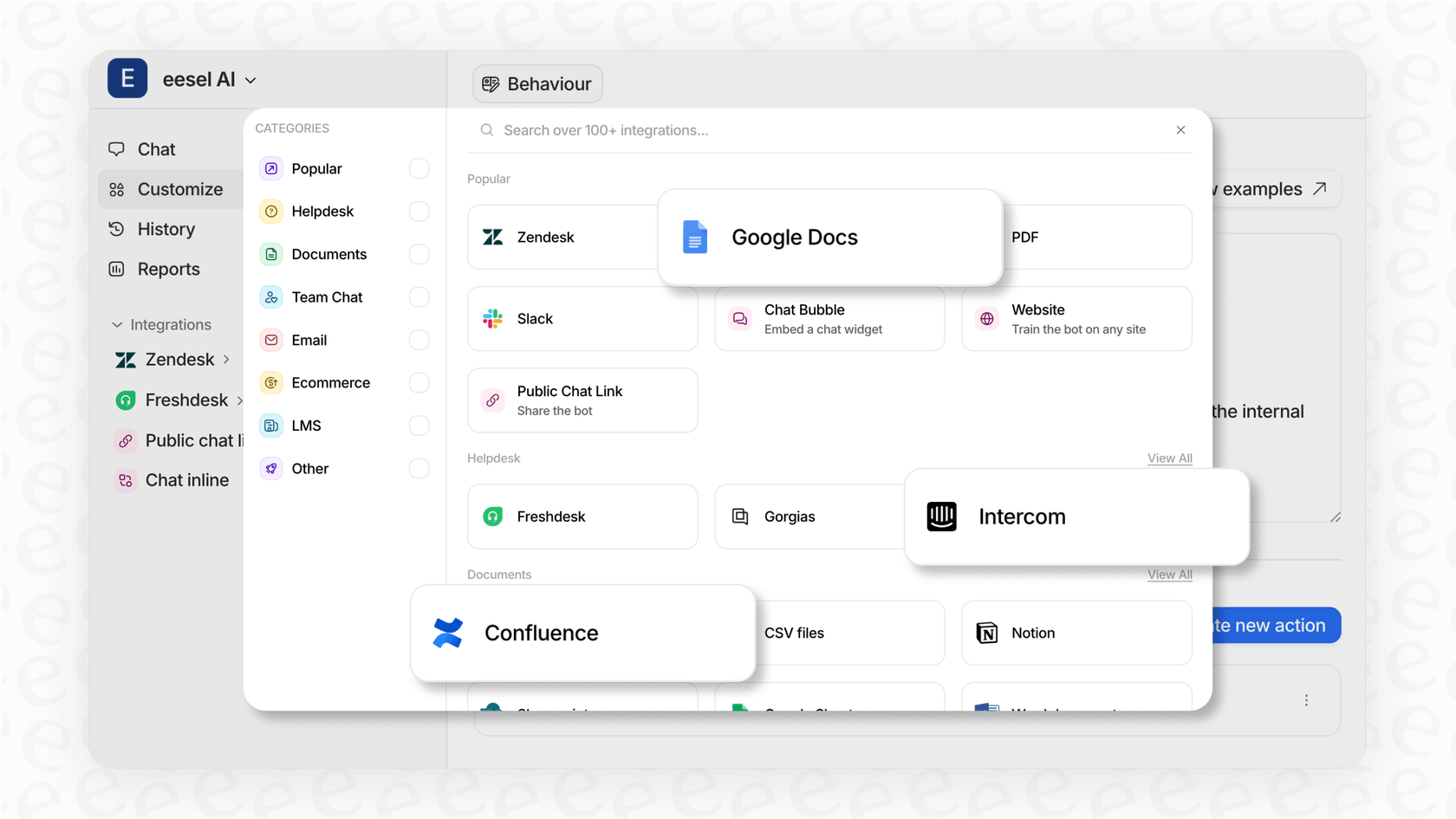
Gaining total control and testing with confidence
You can set up eesel AI yourself in minutes without ever having to talk to a salesperson. It gives you a simple dashboard where you can tweak the AI's personality, restrict its knowledge to certain sources for specific channels, and even test how it would have performed on your team's past questions before you go live. This amount of control means the AI works exactly the way you want it to. You can start small, check its accuracy, and scale up when you're ready, avoiding the expensive leap of faith that Slack AI asks you to take.

| Feature | Slack AI | eesel AI |
|---|---|---|
| Primary Knowledge Source | Messy Slack chat history | Your official docs (Confluence, GDocs, etc.) |
| Setup & Onboarding | Requires admin setup for the whole workspace | Set it up yourself in minutes |
| Customization | Very limited | Full control over AI persona, sources, and scope |
| Integrations | Just basic file previews | 100+ one-click integrations |
| Testing | No free trial or testing available | Test on your historical data before you buy |
| Pricing Model | Per user, per month (for everyone) | Based on usage (pay for what you use) |
Slack AI Search Answers pricing explained
Slack AI is sold as an add-on to its paid plans (Pro, Business+, and Enterprise+) and will set you back $10 per user, per month.
Here’s the kicker: you usually have to buy it for everyone in your workspace. If you have a team of 200 people, that’s an extra $2,000 every single month, whether all 200 of them use the AI or not.
As an alternative, eesel AI's pricing is designed to be way more flexible. Plans start with a flat monthly fee that gives you a big bucket of AI interactions. The price scales with the value you get, not with how many people are on your team. You can even start on a monthly plan and cancel anytime, giving you the freedom to make sure it's the right fit without getting locked into a long contract.
Moving beyond Slack AI Search Answers to a true knowledge hub
Slack AI Search Answers is a step up from the old keyword search, and it can be useful for quickly finding something from a recent conversation.
But because it leans so heavily on chat history, has very few integrations, and comes with a rigid, expensive price tag, it’s just not the right fit for companies that need dead-on accurate answers. To really fix the problem of finding information at work, you need to turn Slack into a central hub that’s connected to your real sources of truth. And for that, you need an AI agent built for the job.
Ready to see what a real AI knowledge assistant can do? Try eesel AI for free and connect it to your knowledge sources in minutes to start getting instant, accurate answers right inside Slack.
Frequently asked questions
Slack AI Search Answers aims to transform chat history into clear, summarized answers to natural language questions. Instead of simple keyword searching, it tries to understand your query and provide direct information from public and private channels, DMs, and some files.
The primary features include natural language search, which provides summarized answers with source links. It also offers conversation summaries, daily recaps for channels, huddle notes, and automatic summaries of some text-based files.
The blog highlights that a significant limitation of Slack AI is its reliance on informal chat history, which can lead to outdated or inaccurate information. It cannot differentiate between official policy and casual conversation, posing risks for critical information.
Slack AI Search Answers has very limited ability to access external knowledge sources like Confluence, Notion, or Google Drive. This means it often works with only a fraction of your company's actual knowledge, potentially requiring users to still search elsewhere for official answers.
Slack AI Search Answers costs $10 per user, per month, and typically must be purchased for every user in your workspace. There is no free trial available, meaning teams cannot test its suitability before committing to a significant expense.
Yes, tools like eesel AI are presented as a more robust alternative to Slack AI Search Answers. eesel AI connects directly to authoritative sources like Confluence and Google Docs, offers more customization, and uses a flexible interaction-based pricing model, allowing for testing before full commitment.
Yes, Slack AI Search Answers respects all existing permissions within your workspace. It will only provide answers from content that you are already authorized to view, ensuring data privacy and security.
Share this post

Article by
Stevia Putri
Stevia Putri is a marketing generalist at eesel AI, where she helps turn powerful AI tools into stories that resonate. She’s driven by curiosity, clarity, and the human side of technology.



